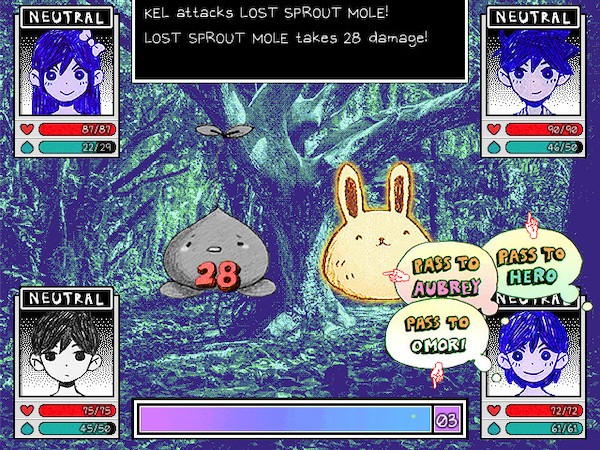 4.8 out of 5 Novov Affirmation Points
4.8 out of 5 Novov Affirmation PointsStar Get! Novov really likes this!
Review: Omori

This blog post deals with mental health issues.
When I was a little boy, I sometimes wondered: why do people get depressed? I was quite naïve sometimes.
Slowly, things changed though. As I grew older and (arguably) wiser, I slowly but surely succumbed murky depths of mental illness myself. It started off slowly, but soon right became wrong and left became right, Thoughts and reality started to blur together. Voices started echoing in my head, telling me everything I was doing was wrong - not just incorrect, but morally depraved. I'd never make anything of myself, and I'd be a failure for the rest of my life. I'd always be an awful person, and I'd never make anything of myself.
I tried to hold things in for as long as I could, to not disappoint both myself and my family. To tell everyone who doubted me that they were wrong. Eventually, though, the symptoms became too much for others as well, and I had to confine myself to my house...
In 2014, Omori was launched on Kickstarter. It was initially planned for a release date in 2015, so plenty of eager backers forked over their cold, hard, cash. Soon, it became apparent that wouldn't happen. News of engine troubles and changes in creative direction spread over social media, and many people didn't think it would release at all.1 But to a lot of people's shock, it did eventually come out - in 2020, when many people were far more concerned with the minor issue of the coronavirus.2 Personally, I'd say the wait was well worth it.
It's a psychological horror role-playing game about the titular child Omori. Living in a rather miserable white room, he often takes a trip to the colourful dream-like world outside. There, he plays with his friends Aubrey, Kel, Hero, and Basil, going on adventures and doing things that kids do. But at the start of the game, Basil has just gone missing.
Actually, let's start again. Omori is a psychological horror role-playing game about... Never mind. You could spoil yourself by, say reading the game's Wikipedia article3, but I would highly recommend you don't. Anyway, onto the game. While certain parts can be dark, this is balanced with a softer exterior; overall, the game takes plenty of cues from your EarthBounds and Undertales. An aura of juvenile wonder permeates many of the environments, in a way that feels a little familiar from my childhood. But just like real life, we all grow up; one has to confront the darker recesses of the world eventually. It's just a question of how and when.
Unlike the events depicted in Omori, I decided long ago that I wouldn't be stuck in my house for almost four years. Instead, I largely remained stuck in my house for a year. Big improvement. Though the game's plot differs from my experience in a lot of ways, many things in the game were familiar to me. Feeling like an outcast; a dreg of society. Having to hide fucked-up things that happened to me from other people.
Regardless of what ends up happening to them, the cast of Omori are largely empathetic and well-written. Both the main gang and side characters deal with their own issues that often tie into the central narrative fulcrum in a unique way. A specific highlight is a certain cetacean who pops up just before one of the game's dramatic moments. His depiction - a concoction of hilarity and zaniness - just oozes creativity.
As a role-playing game, the battle system is a largely turn-based affair. I'm a huge fan of classic turn-based JRPGs, and disagree with them often being maligned by modern gamers. Although it doesn't have the strategic chops to compete with the best of them, the combat is fun and challenging enough. But the real draw is its unique mechanics: status effects involve dealing with a triadic system of emotions. You have Happy, which pulls your turn forward, but at the cost of accuracy. Angry raises your attack but makes you more vulnerable as well. And Sad raises defence but puts you at the back of the turn list. Both enemies and party members can have these emotions applied to them by choice or not, and each one has another that it's strong or weak against. It's a fun twist that shakes things up, although it can be underused in later parts of the game. Your party's damage also accumulates, allowing you to deal powerful "follow-ups" that interact with a friend. Often they've too powerful and make things a little too easy: I was able to complete the game under-leveled. Despite that, they can still be really fun to use against enemies.
Speaking of the enemies, they've depicted in a hand-illustrated style that exudes charm and creativity. In fact, the whole game's art is simply amazing - there's no other way to describe it. It's able to hone in on the requisite playfulness when required, and make things properly scary for the more spoilery parts of the game. A lot of neat artistic touches and narrative elements attain another layer of meaning as you progress, and things reveal themselves in hindsight. Unlike the film I reviewed in April, it doesn't feel hackneyed in the moment either.
Scary stories used to absolutely horrify me as a kid. When making my many requisite trips to the library as a kid, the Goosebumps books were a no-go; I always sticked to the safety of known entities. Growing older, the fear of the unknown became replaced by a fear of the known. These days, I can read and watch metric craploads of horror content and hardly break a sweat. I'm still not a huge horror fan, but I find what I've been through in real life much more scary. Going crazy is a lot more tangible and horrifying than your monster du jour.
As a game that primarily deals with a fear of the known, Omori resonates with me a lot. Although it's a bit of an overused trope in indie circles, depicting this kind of stuff is no mean feat. Everyone deals with mental illness differently, and one person's "realistic" might be the next's "playing into harmful stereotypes in an exceedingly problematic way". While a certain knife initially made me turn my head, I found things were ultimately portrayed respectfully and realistically. The game juggles with heaps of issues in a way that is honestly pretty impressive for something made in RPG Maker.4 I actually forgot it was made in that engine sometimes; the level of thought and flair would be great for even a Unity title.
This amount of care is also invested into a veritable array of side-quests. Most of it is the usual fare, allowing the dedicated player to level up their party that much more and discover tidbits of hidden story content. For instance, you can find humorous quips on signs to put in a "Joke Book"; collecting them all provides an optional quest. But being the un-dedicated player I am, I mostly looked stuff up on the wiki afterwards. If there's one complaint I have, it's that the inscrutability and haphazardness sometimes also applies to the primary gameplay route, making it a bit frustrating to progress at times. If you've more easily scared than I and make a certain decision early on, you can even be locked into a certain narrative choice. But as someone who can be frustrated about getting the wrong ending, that moment is an exception to the rules. This isn't one of those games where you need to be watching every step so you get ending 45 instead of ending 46, and the important decisions are usually clear enough.
In Omori's final act, the results of whatever decision you make come back to haunt you for great or ill. Its ending is a real shock, something that ties all the narrative points and thematic beats of the game into something spectacular. In fact, it's easily one of the best endings I've experienced in a video game. Again, I won't delve into the details, since you should really be just playing the game.5 Yes, I'm saying that again - there's some things you just can't hide from. Some people can learn to deal with their issues; some cannot. But they'll always be there.
 4.8 out of 5 Novov Affirmation Points
4.8 out of 5 Novov Affirmation PointsKickstarter has gained a bit of a reputation as a grifters' paradise - a not undeserved one, given the profusion of blatant scams on the platform. But from my experience, video game failures on the platform tend to be less often scams and more often people who just don't understand the amount of work involved.
Or 5G, if you've an idiot.
Disclaimer: I wrote significant parts of said article.
As someone who's really into programming, I used to be of the attitude that people should just use proper game engines. However, such an attitude locks out a lot of creatives with imaginative and original ideas. In my opinion, it's really the result that matters; tools are ultimately incidental.
Don't get ahead of someone when crossing the river in the raft.